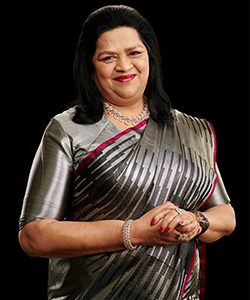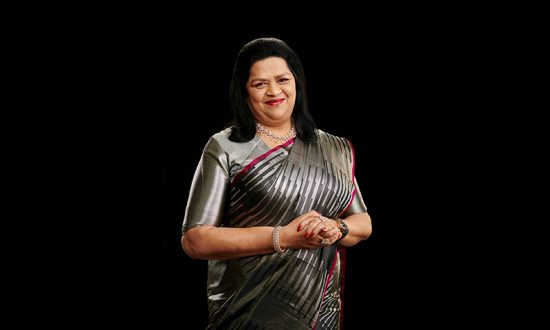Over the decades, among the variety of personalities that have risen to prominence for their contribution in the field of education and social service, Madam Grace Pinto stands out as someone distinctively striking and seminal in her demonstration of commitment towards making a difference through her schools as a leader. With her humble beginnings as a teacher nearly four decades ago, she is today a force to reckon with in the highly competitive and challenging segment of education. As Managing Director, her business acumen coupled with a deep and abiding faith in Lord Jesus Christ has enabled her to partner her husband, Dr A. F. Pinto, Chairman, Ryan Group, in building one of India’s largest privately owned and managed chain of K-12 institutions. A dedicated faculty, trained and led by her team, supported with state-of-the-art infrastructure and Information Communication Technology (ICT), the Ryan Group is responsible for educating lakhs of students globally through diverse national and international curricula. In an interaction with Higher Education Digest, Madam Grace Pinto talks about the impact of COVID-19 on the Indian k12 Education, how does the Ryan International Group of Institutions make its education exciting and useful for its learners, and many more.
How has been the impact of COVID-19 on the Indian k12 Education sector so far? How will it affect the upcoming academic years?
Indian K-12 sector has evolved tremendously over the past few months, thanks to the ed-tech interventions employed by various schools for the benefit of the children. Lifelong learning as the essence of the NEP, we saw it in action as the staff had to unlearn and relearn and learn new strategies and tools that were available online to provide a productive learning experience for the students. As a result, there has been a seamless transition for many schools from offline to a virtual interactive model of learning. There has been newness in many things, constant reinvention and gradual transformation taking place in the K12 segment to enhance the teaching-learning processes.
Technology has definitely proven to be a good disruptor in the education sector. And as a result, it enabled the schools to provide unhindered access to virtual learning. In the forthcoming years, seems like blended learning may be the new normal. Considering this, COVID-19, which was thought to be for our harm, worked out for the good of the education sector. It is encouraging that schools have remained committed to ensuring that quality teaching-learning continues through the virtual learning platforms and different ed-tech apps to support wholesome learning experience for the students.
There has been an increase in the adoption of Edu-tech by Education Institutions across the country. How do you see this trend? What are the efforts of Ryan International Group of Institutions in this regard?
Over the last decade, there has been a significant increase in the usage of tech platforms in every field, and education is no exception to it. The pandemic situation led schools to use virtual/remote learning platforms to reach out to students and provide them with continuous learning opportunities. We can already foresee a robust growth of ed-tech in the country soon. Also, in future, schools may gradually adopt a smart school model or a hybrid model where the dependency on ed-tech platforms is evident. At Ryan Group, we used to partially use the virtual online platform. Still, we transited to using it as the primary mode of teaching through our in-house internal learning management system.
Do you think the gaining popularity of online learning will affect the demand for traditional educational institutions? How can our educational institutions utilize both conventional and online education for the benefits of our students?
Although in future, we look at a further deep dive in this virtual learning trend in the K12 sector, it will not hamper the demand of traditional educational institutions. As said earlier, there will be a gradual transition of traditional school set ups being more open to a hybrid school model. Academic learning with constant upgrading in tech-tools can be seamless and effective. However, the holistic development through extra-curricular, one-on-one communication, experiential learning and real-time school activities with teachers as mentors will continue to remain an extremely integral part of a child’s education. Therefore, as stated earlier, blended learning will be the new normal.
Accessibility has been the biggest challenge for students from rural parts of the country during this time of the pandemic. How can we solve the problem of the digital divide between urban and rural India?
Our schools are spread across not only in metro cities but also in tier II towns as well as in some rural areas, and we have seen tech infrastructure getting better along with time and more standardized across all our schools. Although some temporary challenges and teething issues apart, there has been more or less a standardized delivery of learning opportunities made available to all Ryanites across the country. Similarly, as the ground has been broken, we are hoping to see the great digital divide being reduced with the attention paid to infrastructure being improvised in the villages and remote inter-lands with the smart technology as the new reality of digital India. Some initiatives have been taken by the HRD ministry towards the very end as Swayam Prabha DTH channels with endeavours to ensure learning opportunities are made available to those who want to learn.
According to you, what are the key characteristics of an effective e-learning program? How does the Ryan International Group of Institutions make its education exciting and useful for its learners?
The proverb says, “Train children in the way they should go, and when they are old, they will not turn from it.” What we are basically doing is nurturing the 21st-century skills in our children to take ownership of their learning process and journey. It is made possible when you allow them to face their learning to meet the outcome. Taking ownership of one’s learning involves not only independence but also a responsibility. Therefore a lot of life skills are learnt in the process. Our teachers have demonstrated commitment to ensuring that our children are engaged productively and enjoy learning.
We were one of the first private groups of schools to introduce e-learning classes and even consulted with noted ed-tech experts to deliver a seamless interface that ensured the students and teachers faced minimum stress during a live class. About one million+ remote learning sessions have been delivered to date for grades 1 to 12 over the past few months. Also, we have received constructive feedback which enables us to do better in refining the learning outcomes. Apart from that, our children have also enjoyed the co-curricular activities through virtual participation in activities that go beyond the books. Workshops focusing on the physical and mental well-being of the students as well as creativity-enhancing workshops have also been conducted to enable the student to stay focused and active. We are grateful for the parental support and community participation in this entire process.
In India, what are the common challenges teachers face during online classes and how to overcome them?
One of the common challenges faced by the teachers is ‘weak network’. As stated earlier, once the infrastructure is in place with a better network, Wi-Fi and channel for continual viewing of programs, as well as more attempts are explored to ensure continuous availability of learning opportunities for children according to the grades, we will encounter lesser problems. Although the transition from offline to virtual learning interface was a sudden one, people demonstrated that they are lifelong learners in the way they took up the challenge and learned new things and unlearned their previous knowledge of how to do things and redesigned their lesson plans to meet the refined learning outcomes. As a result, the transition became quicker to the virtual platform at the Ryan Group. Similarly, teachers across had to adapt to the virtual platform rather quickly because learning can never stop for the teachers or the students.
What is your advice to the academicians and administrators across the country?
Technology and Virtual learning as an integral part of the education system are here to stay. Therefore the obvious focus of academicians needs to be on leveraging technology, active collaboration, and capacity building to deliver an immersive learning experience online. Exploring the e-learning ecosystem will continue to remain as the top priority to offer our students a platform that benefits them the most. What we now perceive is that hybrid blended learning with ‘face-to-face classrooms and virtual lessons’ will be the future of education that will provide engaging and meaningful learning experiences for our students. Similarly, the assessments also need to be changed accordingly, focusing on conceptual learning, monitoring the progress and providing timely guidance to enhance children’s learning outcomes and growth. With the New Education Policy (NEP), the whole pedagogical framework has undergone a change. Therefore we will stand to benefit if we embrace the changes proactively and redesign and redefine our learning outcomes to make out children more global citizens.
More about Madam Grace Pinto

Madam Pinto’s determination and energy in accomplishing the vision “Excellence in Education and All-Round Development” makes her a stalwart in the field of education in the country. Her contribution to the segment of education and social service has been recognized with several national and international honours. Recently she was presented with ‘Visionary Leadership in Education Award” by the prestigious Mid-day News Paper in Mumbai.
Her career is packed with many firsts. Under her guidance, the Ryan Group was the first in the country to host the International Children’s Festival of Performing Arts (ICFPA) and the Indian Model United Nations (INMUN) at a national level. The Group hosted the prestigious World Scholar’s Cup with record-breaking participation. It is now the largest ever regional round in the history of the World Scholar’s Cup. International Cultural Exchange programmes are also a regular feature arranged with institutions based in Europe and beyond. The Group has even partnered with NASA for educational programmes to help students hone their scientific temper and has collaborated with PennHub to provide higher education opportunities for students. She has also collaborated with sport and media professionals to bring in the best resources for her students. They provide world-class coaching in sports and usher in the latest trends in media studies. Thanks to the vision, grit and determination of Madam Grace Pinto, hundreds of thousands of children and youth in India have the opportunity to grow holistically and aspire towards excellence in life.
She champions the cause of the underprivileged as well as the welfare of senior citizens through several initiatives. She continues to inculcate the value of respect towards the elderly persons of our society among her students. She is an epitome of service, commitment, and charity. Her willingness to reach out to society and support social causes has been remarkable. She works hard for women empowerment and the cause of the girl child.
In conclusion, it can be said that the Ryan Group has made a significant contribution to the field of education and social service sphere. Thanks to the vision, grit and determination of Mrs Pinto, several thousands of children have been provided with an affordable quality education to grow holistically and aspire to excel in life.




